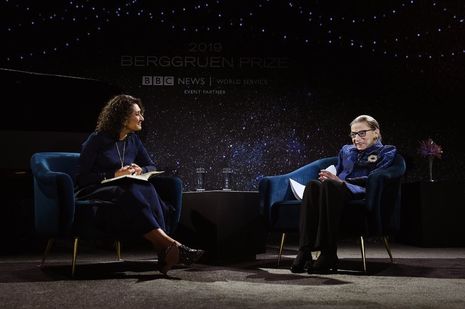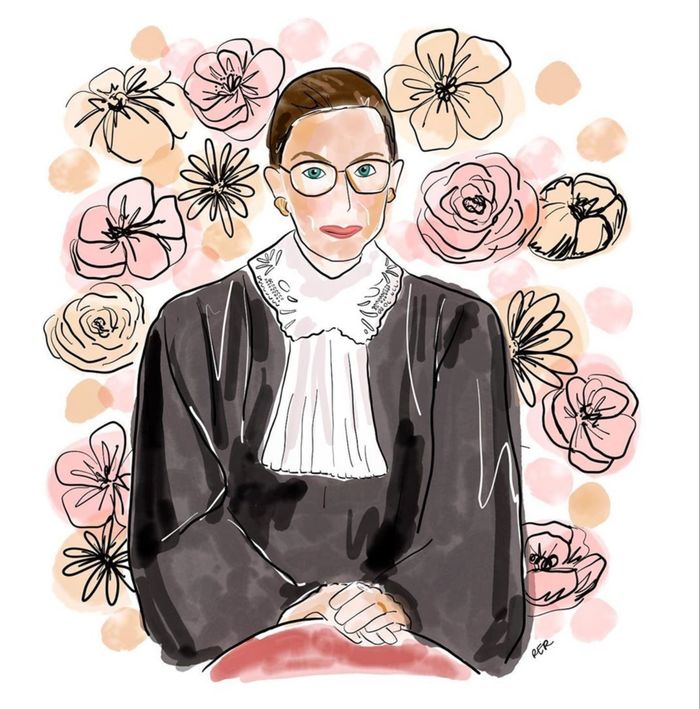Razia Iqbal on interviewing Ruth Bader Ginsburg
Journalist Razia Iqbal speaks to Amy Walpole about leading one of RBG’s last interviews – and the peculiar presence of the legendary figure.

To many, the death of Supreme Court Justice Ruth Bader Ginsburg came as a blow. As a journalist and presenter of Newshour on the BBC World Service, Razia Iqbal’s first thoughts were not directed towards her programme’s coverage of RBG’s death, however. Her first thoughts went to Clara Spera, RBG’s granddaughter. She had met Spera a year earlier at the New York Public Library, where her grandmother was awarded the Berggruen Prize for Philosophy and Culture.
I met up with Razia by BBC’s Broadcasting House to talk to her about her experience interviewing RBG for the prize in front of a live audience, in what ended up being one of RBG’s last interviews.
“I knew in the back of my mind that this was probably going to be one of her last big interviews”
Iqbal is no stranger to interviewing notable figures, from the likes of Carrie Fisher, to Salman Rushdie, to the Prime Minister of Armenia, but as anyone would be before such a high-profile interview, she was nervous.
“I won’t interview anyone unless I’ve read reams and reams and reams about them”, she says. But with RBG, who had lived such a full life, there was a huge amount of material to get through: “I’d read all her dissenting opinions...I read two books, endless articles, I’d watched the documentary and the film as well, and even that didn’t feel enough.”
In the run up to the event in December 2019, it was unclear if the interview would even take place. “Obviously I was very very excited, but, it was also very worrying because she was very frail and by this stage she had had three bouts of cancer, and right up until the last minute they kept saying we don’t know if it’s going to happen”, she recalls, “and I knew in the back of my mind that this was probably going to be one of her last big interviews and this would be what would be used when she died, which turned out to be the case.”
Another cause for concern came from the back and forth between Razia, RBG’s and the Berggruen Prize’s teams, who wanted a list of prepared questions from her, and assurance that she would only focus on the law. Razia refused, but they kept asking. And on top of this there was the pressure of getting RBG to say something new in the interview, knowing that she “had to get some news lines out of it.”
“Her humour was present throughout that whole [interview], she was smart enough to not be rude about Donald Trump - she just came out with an observable fact.”
Although she only got to meet RBG an hour before the live interview, Iqbal recalls meeting RBG’s bodyguard the night before. Taking the opportunity to calm some of the uncertainty, with emails still coming in overnight asking for a list of prepared questions, she remembers asking him, “She’s going to be okay, right?” The bodyguard took her to one side and told her “don’t worry, it’s going to be fine.” Razia remembers not quite being reassured. “Even though he said that… I just kept thinking, this is going to be a disaster”, she told me.
When it came to the live interview, in those first moments stepping out onto the New York Public Library stage, Iqbal remembers how the first thing that stood out to her was RBG’s physicality: “she was tiny, tiny, tiny”, she says. “I really wanted to shake her hand, but I think it was quite hard for her to even put her neck up to see that I was there. I immediately looked at her and I just thought, wow, you’re so frail”, she adds.
In those first moments, Razia told me, “I felt really nervous about all the things that I was supposed to be doing [like] being strong, and pushing her.” But RBG was up to the task, unfazed by not having the questions beforehand, and as Iqbal says, “when she actually started to speak...I knew she was going to answer anything that I would ask her.”

The importance of ageing female role models
And Razia got her news lines. When she asked for RBG’s thoughts on Donald Trump’s call for the Supreme Court to stop the impeachment process, RBG simply said: “The President is not a lawyer, he’s not law trained.” “That was great”, Iqbal says, “her humour was present throughout that whole [interview], she was smart, she was smart enough to not be rude about him - she just came out with an observable fact.”
One of the things that struck Iqbal most was how unlike a lot of other successful women RBG was, and that she “was not as radical as everyone says she was.” In comparison to other historically significant feminist figures like Gloria Steinem, RBG came across much less forcefully. “People like [Steinem] demanded things, they were angry, and I don’t think Ruth Bader Ginsburg has ever been angry. There was nothing about her that wasn’t measured, that wasn’t quiet, that wasn’t calm” she says, “and I walked away from that as somebody who is quite angry about lots of things, feeling really intrigued by the idea of being quiet.”
That’s not to say that RBG didn’t support new and radical voices, in the interview citing young people as one of her reasons to be optimistic about the future. “It felt so encouraging that somebody who was approaching 90 was so heartened by people like Greta Thunberg and Malala Yousafzai”, Iqbal says.
There seems to have been something extraordinary not only about RBG’s life story and successes but even her very presence. I quote to Razia the words of one attendee of the event, who said: “The only reason I am here tonight is to just share the same oxygen as the Notorious RBG.” Razia laughs, and agrees, saying, “in the end you walk away from things like that and you just think, what an absolute privilege just to have been in her ambit for a short time.”
 News / Eight Cambridge researchers awarded €17m in ERC research grants27 December 2025
News / Eight Cambridge researchers awarded €17m in ERC research grants27 December 2025 News / Clare Hall spent over £500k opposing busway 24 December 2025
News / Clare Hall spent over £500k opposing busway 24 December 2025 Comment / League tables do more harm than good26 December 2025
Comment / League tables do more harm than good26 December 2025 Comment / The ‘class’ of Cambridge24 December 2025
Comment / The ‘class’ of Cambridge24 December 2025 News / Caius mourns its tree-mendous loss23 December 2025
News / Caius mourns its tree-mendous loss23 December 2025








